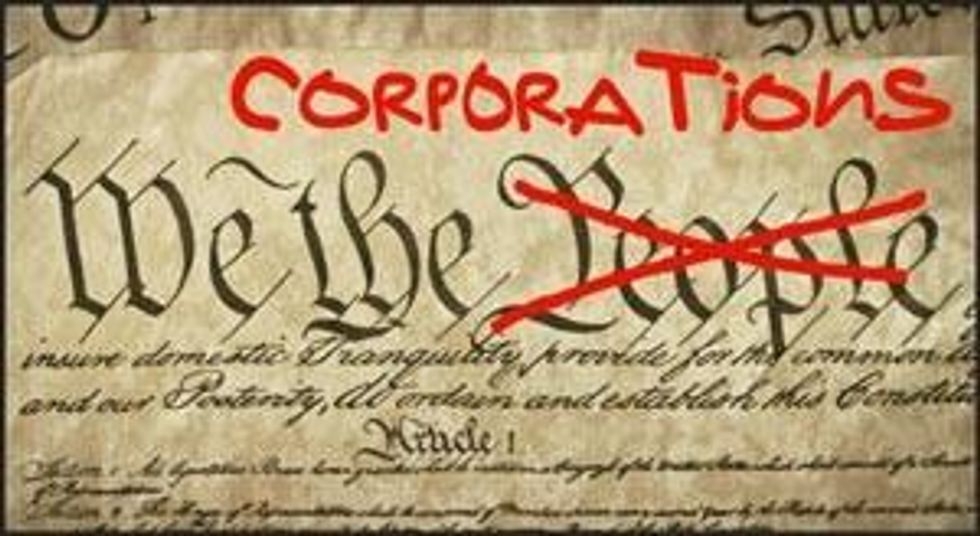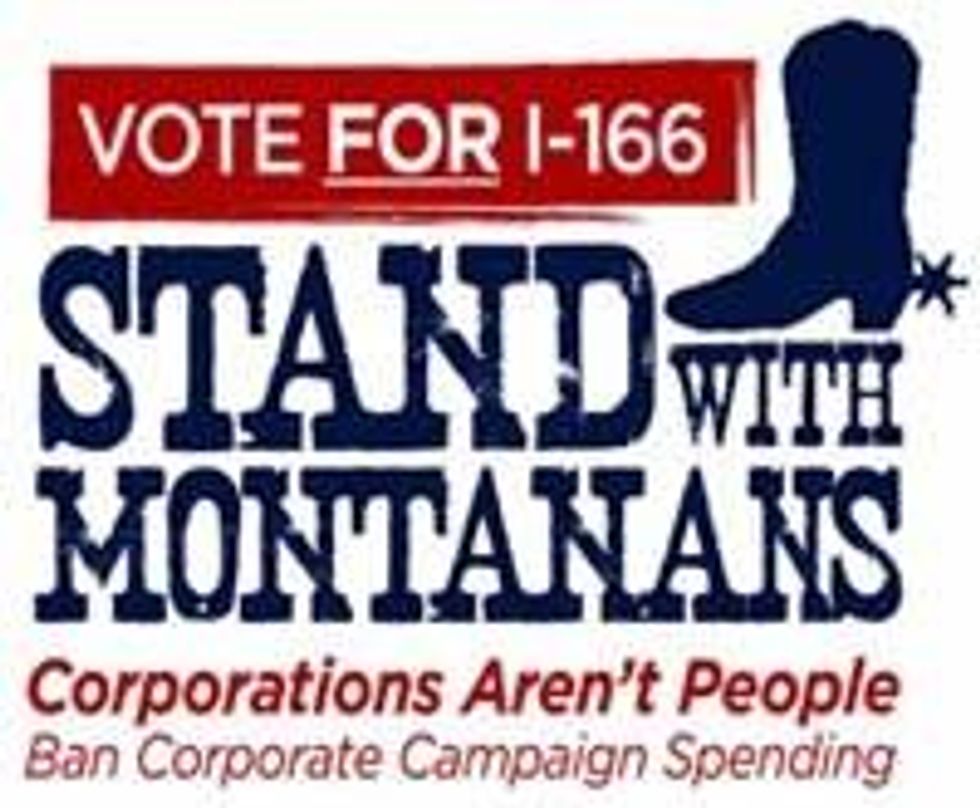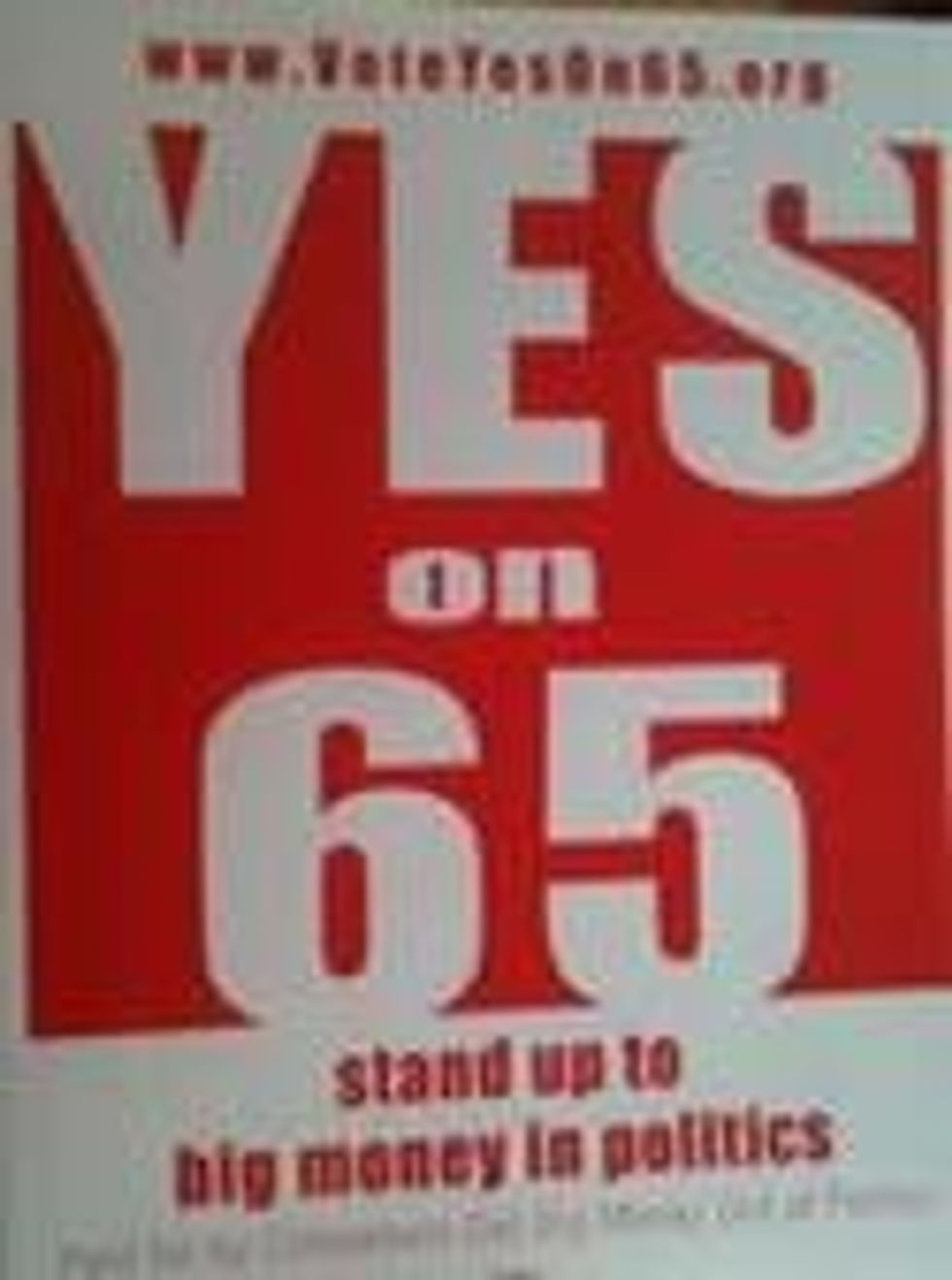

SUBSCRIBE TO OUR FREE NEWSLETTER
Daily news & progressive opinion—funded by the people, not the corporations—delivered straight to your inbox.
5
#000000
#FFFFFF
To donate by check, phone, or other method, see our More Ways to Give page.


Daily news & progressive opinion—funded by the people, not the corporations—delivered straight to your inbox.
The Supreme Court's Citizens United decision of 2010 allows for corporate and union donors to contribute unlimited amounts of money to any given organization that deals in "electioneering communications," or political messaging ahead of any given campaign. The idea behind the decision, which ruled in favor of the conservative non-profit organization Citizens United, is that corporations and non-profits, like people, should be able to use their money for public political messaging and advertising -- effectively giving free speech rights to corporations previously reserved for individuals.

"Shadow Money" groups in particular do not have to disclose those who donate to their organization, hence the name. Filing as a tax-exempt 501c(4)s grants groups this invincibility.
Even with "Shadow" or undisclosed money unaccounted for, however, if predictions come true, disclosed non-party outside spending alone could total an unprecedented $1 billion in 2012.
Multiple groundswell campaigns across the country have called on state legislators to pass an amendment overturning the Citizens United ruling, saying that allowing corporations to dominate election messaging tilts the scales in favor of big money interests and away from those of ordinary citizens.
Voters in Montana and Colorado will vote this November on such resolutions, which have reached ballots by way of citizen petitions.
* * *

The Basics
The Corporate Contributions Amendment, also known as I-166, will appear on Montana's November 6, 2012 general election ballot. The measure, proposed by the group Stand with Montanans, would determine state policy on prohibiting corporate contributions and expenditures in state and national elections. The measure seeks to charge state lawmakers with furthering the state's policy on the matter and ask congressional delegates to support efforts to overrule the Citizens United decision by amending the U.S. Constitution.
Yes on I-166
Polling on Montana I-166
| Date | Pollster | Yes | No | Undecided |
| 9/10-9/11 | Public Policy Polling | 53 | 24 | 23 |
* * *

The Basics
Amendment 65 seeks to strike down the U.S. Supreme Court's controversial 2010 Citizens United decision by instructing state lawmakers and Colorado's congressional delegation to push for and support campaign finance reform at the federal level.
No on 65
Polling on Colorado's Amendment 65
No public polls have been released yet.
# # #
Dear Common Dreams reader, The U.S. is on a fast track to authoritarianism like nothing I've ever seen. Meanwhile, corporate news outlets are utterly capitulating to Trump, twisting their coverage to avoid drawing his ire while lining up to stuff cash in his pockets. That's why I believe that Common Dreams is doing the best and most consequential reporting that we've ever done. Our small but mighty team is a progressive reporting powerhouse, covering the news every day that the corporate media never will. Our mission has always been simple: To inform. To inspire. And to ignite change for the common good. Now here's the key piece that I want all our readers to understand: None of this would be possible without your financial support. That's not just some fundraising cliche. It's the absolute and literal truth. We don't accept corporate advertising and never will. We don't have a paywall because we don't think people should be blocked from critical news based on their ability to pay. Everything we do is funded by the donations of readers like you. Will you donate now to help power the nonprofit, independent reporting of Common Dreams? Thank you for being a vital member of our community. Together, we can keep independent journalism alive when it’s needed most. - Craig Brown, Co-founder |
The Supreme Court's Citizens United decision of 2010 allows for corporate and union donors to contribute unlimited amounts of money to any given organization that deals in "electioneering communications," or political messaging ahead of any given campaign. The idea behind the decision, which ruled in favor of the conservative non-profit organization Citizens United, is that corporations and non-profits, like people, should be able to use their money for public political messaging and advertising -- effectively giving free speech rights to corporations previously reserved for individuals.

"Shadow Money" groups in particular do not have to disclose those who donate to their organization, hence the name. Filing as a tax-exempt 501c(4)s grants groups this invincibility.
Even with "Shadow" or undisclosed money unaccounted for, however, if predictions come true, disclosed non-party outside spending alone could total an unprecedented $1 billion in 2012.
Multiple groundswell campaigns across the country have called on state legislators to pass an amendment overturning the Citizens United ruling, saying that allowing corporations to dominate election messaging tilts the scales in favor of big money interests and away from those of ordinary citizens.
Voters in Montana and Colorado will vote this November on such resolutions, which have reached ballots by way of citizen petitions.
* * *

The Basics
The Corporate Contributions Amendment, also known as I-166, will appear on Montana's November 6, 2012 general election ballot. The measure, proposed by the group Stand with Montanans, would determine state policy on prohibiting corporate contributions and expenditures in state and national elections. The measure seeks to charge state lawmakers with furthering the state's policy on the matter and ask congressional delegates to support efforts to overrule the Citizens United decision by amending the U.S. Constitution.
Yes on I-166
Polling on Montana I-166
| Date | Pollster | Yes | No | Undecided |
| 9/10-9/11 | Public Policy Polling | 53 | 24 | 23 |
* * *

The Basics
Amendment 65 seeks to strike down the U.S. Supreme Court's controversial 2010 Citizens United decision by instructing state lawmakers and Colorado's congressional delegation to push for and support campaign finance reform at the federal level.
No on 65
Polling on Colorado's Amendment 65
No public polls have been released yet.
# # #
The Supreme Court's Citizens United decision of 2010 allows for corporate and union donors to contribute unlimited amounts of money to any given organization that deals in "electioneering communications," or political messaging ahead of any given campaign. The idea behind the decision, which ruled in favor of the conservative non-profit organization Citizens United, is that corporations and non-profits, like people, should be able to use their money for public political messaging and advertising -- effectively giving free speech rights to corporations previously reserved for individuals.

"Shadow Money" groups in particular do not have to disclose those who donate to their organization, hence the name. Filing as a tax-exempt 501c(4)s grants groups this invincibility.
Even with "Shadow" or undisclosed money unaccounted for, however, if predictions come true, disclosed non-party outside spending alone could total an unprecedented $1 billion in 2012.
Multiple groundswell campaigns across the country have called on state legislators to pass an amendment overturning the Citizens United ruling, saying that allowing corporations to dominate election messaging tilts the scales in favor of big money interests and away from those of ordinary citizens.
Voters in Montana and Colorado will vote this November on such resolutions, which have reached ballots by way of citizen petitions.
* * *

The Basics
The Corporate Contributions Amendment, also known as I-166, will appear on Montana's November 6, 2012 general election ballot. The measure, proposed by the group Stand with Montanans, would determine state policy on prohibiting corporate contributions and expenditures in state and national elections. The measure seeks to charge state lawmakers with furthering the state's policy on the matter and ask congressional delegates to support efforts to overrule the Citizens United decision by amending the U.S. Constitution.
Yes on I-166
Polling on Montana I-166
| Date | Pollster | Yes | No | Undecided |
| 9/10-9/11 | Public Policy Polling | 53 | 24 | 23 |
* * *

The Basics
Amendment 65 seeks to strike down the U.S. Supreme Court's controversial 2010 Citizens United decision by instructing state lawmakers and Colorado's congressional delegation to push for and support campaign finance reform at the federal level.
No on 65
Polling on Colorado's Amendment 65
No public polls have been released yet.
# # #